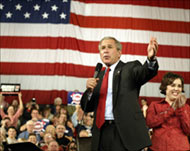US economic strength open to doubt
As President George Bush appeared at his own economic summit in Washington, questions are still being asked about the true strength of the world’s biggest economy.

While the media continues to report about the Wall Street year-end rally, other important factors are slipping under the radar.
The US administration has just slapped a series of tariffs on foreign producer nations. Most recently, Chinese clothes were given their own buttoned-up trade barrier, as were those of Vietnamese origin.
These duties come on the back of others, such as those in protest against the US shrimp fishing industry. Here tariffs were also imposed on China (112%) and once again on Vietnam (93%) in July of this year.
The harm to the Vietnamese economy is undoubted as shrimps are Vietnam’s third biggest export, employing more than two million people.
Double standard
The US argues that these countries produce their goods too cheaply. The government used anti-dumping laws to introduce their unilateral tax by saying that China and Vietnam are not market economies.
 |
|
US anti-dumping laws are hurting |
However, the recent track record of the US on tariffs is not a good one. The tariffs on steel undertaken by the administration of President Bush in 2002 were declared illegal by the World Trade Organisation.
But not before their job-retaining effects had been felt in important election battlegrounds, such as the steel-producing state of Ohio.
US historian and current-affairs analyst Noam Chomsky of the Massachusetts Institute of Technology in Boston, told Aljazeera.net: “The US follows the general historical pattern: free markets are good for you, but I demand protection from the powerful nanny state.”
The Bush administration also imposed the controversial Farm Bill of 2002 which promised about $180 billion in subsidies to farmers.
Along with the European Union’s farm subsidies, these government payments hurt farmers in impoverished countries and led to the stalling of global agricultural agreements.
Mostly illusory
“That’s the core of the real economy,” Chomsky said. “It goes way back, in many forms, not only in the US of course. That’s basically the history of every developed society. What the 19th-century economist Friedrich List called ‘kicking away the ladder’.
 |
|
The US economy’s fundamentals |
“First we climb it, then we kick it away so that you can’t climb it. In a complex world, nothing works as simply as that, of course, but it is a rather good first approximation to reality. Far more so than market doctrines, which are mostly illusory.”
These new tariffs are of course deeply connected to the rest of the US economy. Perhaps most notably to the falling value of the dollar. Its fall is supposed to stir US exporters, especially in manufacturing. And likewise deter importers, making their goods more expensive.
Yet so far this has not been the case, despite the dollar reaching record lows against the euro and recent lows against the Japanese yen.
Despite the continued slump in its value, US imports have continued to surge, even from the Eurozone. In October the monthly US budget deficit reached an all-time high of $55.5 billion, up from $50.9 billion the previous month.
Moral problems
The main beneficiary, China, is completely unaffected by the dollar’s fall as the officials in Beijing continue to peg the Chinese yuan to the value of the dollar.
Hence the attractiveness of tariffs to the Bush administration. Yet it is these policies that are creating the ever-increasing budget deficit.
 |
|
Bush has drawn heavy flak for |
Even inside the US government’s budget committee, there are increasing fears over the size of the debt America is fixing itself to.
Democratic congressman John Spratt said the budget deficit would lead to $7 trillion of debt within 10 years and that it was more than a fiscal or structural problem – “it is a moral problem”.
So while imports into the US surge, due to a lack of competitively produced goods at home, the dollar is still falling. As those imports are increasingly more expensive, this has started to filter through into inflationary pressures within the US economy.
Thus it was not surprising that this week saw the Federal Reserve Chairman Alan Greenspan raise US interest rates to 2.25%, reflecting increased costs for business.
No good news
Also contributing was the stubbornly high, but dollar-denominated, price of its main fossil fuel, oil. A failure to see US oil stocks build this week saw the price stay above $41.
Although these kinds of worries are nearly immaterial for the top 5% of earners in the US, none of this makes good news for the ordinary American.
 |
|
Oil price increases and a weak |
As oil price increases add to inflation, so does a weak dollar. Record government spending by President Bush does the same.
As a result, colossal personal debt levels could be hit by rises in interest rates, possibly pricking the US housing bubble and throwing millions into fiscal uncertainty.
If that happens, the asset-based cash bonanza – people taking out cash from the increased value of their housing – may finish. The fear is that this would in turn stifle US consumption and lead to a global economic downturn.
President Bush’s summit revelled in his re-election and handsome profits for Wall Street. Yet it seems the other problems for the US economy are not so much eliminated but stored carefully away for the festive season. It may yet be the biggest illusion of all.